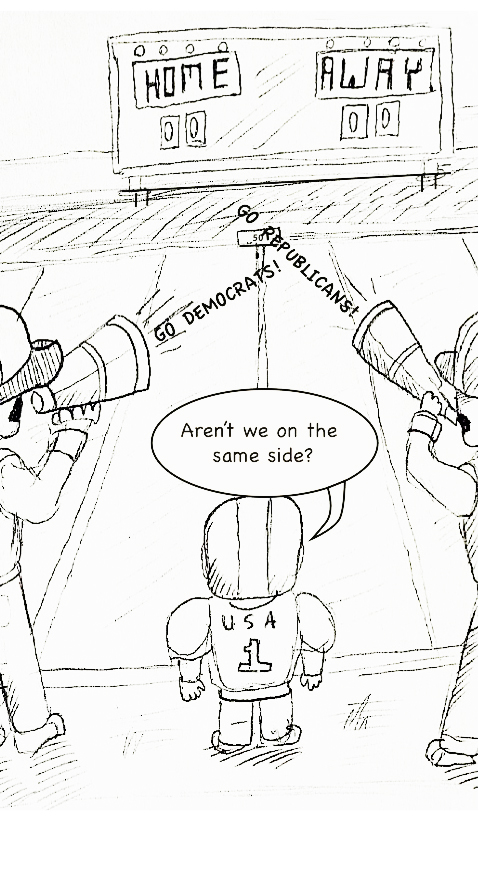In every news source, you’ll find someone declaring that our country is a hopelessly divided nation and all compromise is impossible. To which I say, well, not with that attitude.
It’s true that there are many political issues that are unlikely to be resolved soon. Sometimes, in deadlocked subjects such as abortion, we have to agree to disagree. But the problem is not that citizens disagree about a variety of topics, the true failure that led to this “divided nation” is the inability to have productive debates.
In our YouTube-comments culture, it has become ubiquitous that political arguments are just about volume, likes, follows, who is louder, and who’s better at insulting the other side. 140 characters and a cloud of dust. But the future of political debate isn’t so dismal, as long as we take responsibility to change the culture.
No matter the party platform, Democrats, Republicans, Independents and everyone in between have one resounding similarity despite a myriad of differences. They all want to make the country better. They may have different theories, different methods, and different theories about different methods, but all policymakers look back at their decisions and hope they will bring a brighter tomorrow. We’re part of the same team.
Taking this common-ground approach to create more productive debate means recognizing the good intentions of the opposite side. Disagreeing with someone is not a personal insult. It means listening carefully and patiently to their points, calmly expressing your side, and always showing respect for their opinion. And I mean actually respecting their viewpoint; respect isn’t merely waiting to explode into expletives. Diversity makes America a stronger nation, which includes diversity of opinion. Remember that people have different backgrounds and perspectives; they deserve respect, not a condescending attitude or a dismissive “check your privilege.”
Save the strong language for when it’s required. Labeling someone who opposes NSA surveillance a terrorist, or denouncing someone who disagrees with affirmative action policies as a racist — such proclamations poison debate and render compromise unattainable. Most importantly, overuse of extreme terms trivializes the true terrorists bombing subways in England, or the real racists proclaiming “Hitler was Right” regarding the Gaza conflict. Those actions were and are abominable, and merit strong terms.
Want to know the awesome part about civilized debate? It can change your opinion. What if, instead of calling the person against NSA a terrorist, you told them that the NSA cannot access the content of a phone call without a warrant? You might make them think. They might even say, “Huh, well maybe the NSA isn’t all bad.” Or what if you showed the person against affirmative action, in lieu of calling them a racist, a series of articles showing how affirmative action provided impoverished students with their first opportunity to succeed? They might see some of the policy’s positives. Sure, they probably won’t do an about-face on the issue, but it opens the door to compromise.
A few guidelines will facilitate establishing a Jeffersonian paradise of educated masses in political debate. If someone doesn’t want to argue, don’t force them. If you don’t want to argue, don’t fire off your opinion and then say, “I don’t want to argue,” because that implies, “Your opinion is not worth my time.” Professors aren’t necessarily right on issues, but you’d better debate at an appropriate time and have your argument straight; they will know the facts. If you don’t know enough about an issue to argue, say so, and make an effort to learn.
With some common ground, mutual respect, and a couple rules of engagement, I feel confident our campus will become a dynamic center of informed political debate. My hope is that this column will serve as a bipartisan reminder that there are always middle-ground issues on which we can agree. And maybe we’ll find a way to tie together this divided nation and reach across the aisle.
Email Sumner Higginbotham at sshigginbotham@email.wm.edu.


Great article Sumner!